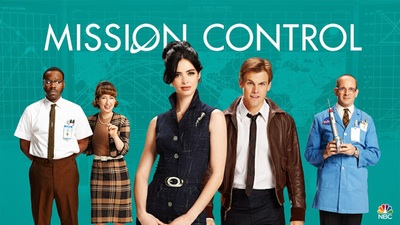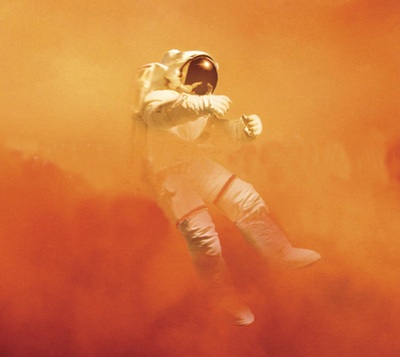Gravity’s rainbowby Dwayne A. Day
|
| It seems almost redundant to point out the odd fact that at a time when many people in the general public think that NASA has shut down and the United States no longer has any astronauts, astronauts have become a new hot commodity for mass culture. |
When SyFy showed off Ascension this past July at San Diego Comic-Con they had just filmed the first episode and were scheduled for a November debut. But the show has now been slipped to mid-December and contrary to what they said in July, the network has decided to air the entire season over three days, essentially as a miniseries rather than a weekly series. Whether this was the plan all along we don’t know.
Mission Control
Mission Control is… or rather was, an NBC pilot sitcom set in 1962 and focusing on a former fighter jock and the people he works with trying to launch astronauts into space. The last time NBC provided any information about it, the show was apparently scheduled as a midseason replacement, meaning that it could air sometime in early 2015. However, NBC pulled the plug on it in mid-October.
That’s a shame, because there was one surefire reason to watch this show: actors Malcolm Barrett and Jonathan Slavin, who previously played laboratory scientists on the short-lived, dearly-lamented ABC sitcom Better Off Ted. Their comedic timing was amazing as they bickered and finished each other’s sentences, all the time developing dubious products like weaponized pumpkins for an immoral giant corporation named Veridian Dynamics (sample commercial: “Veridian Dynamics. Diversity: just the thought of it makes these white people smile.”). The two were cast as engineers in the pilot, and if Barrett and Slavin played essentially the same characters in Mission Control they would have been fun to watch. Alas, we’ll probably never get that chance. (If somebody wants to smuggle me a bootleg copy of the pilot, I won’t tell anybody. Promise.)
 Gravity wasn’t strong enough to get Mission Control on the right trajectory. |
The Astronaut’s Wives Club
This miniseries, based upon the book of the same name by Lily Koppel, was announced in October 2013. The book, and presumably miniseries, follows the lives of the women left at home as their Mercury astronaut husbands bedded secretaries at Cape Canaveral and occasionally flew into space. But the show was still announcing major cast members as of this fall, perhaps indicating a protracted development process due to legal issues with the still-surviving wives. They started filming the first of ten episodes a few weeks ago and it will air in spring 2015.
An Astronaut’s Guide to Life on Earth
| Replicating the feel of the Red Mars books would be a big challenge even for a network like HBO. Spike TV? |
The most famous recent astronaut is Canadian Chris Hadfield, whose regular reports from the International Space Station on subjects such as what happens when you cry in space, or his video singing David Bowie’s “Space Oddity” while strumming a guitar, earned him a broad following and made astronauts suddenly seem, well, interesting. Now ABC has bought a pilot sitcom based upon Hadfield’s book An Astronaut’s Guide to Life on Earth. Apparently it will be about an astronaut’s return to life with his family after his last space mission. TV shows rarely succeed or fail based on their source material, and whether this pilot makes it to series and lasts more than nine episodes will have little to do with the main character being an astronaut (or bartender, or theoretical physicist) and everything to do with the writing and the acting.
Red Mars
Kim Stanley Robinson’s 1990s trilogy Red Mars, Blue Mars, and Green Mars was an epic tale of the near future. Now Spike TV (yes, I don’t believe it either) is developing the trilogy into a TV series. This should be the most exciting news about an upcoming space show, but the fact that it is from a network best known for showing skateboarding and extreme sports and with no reputation for scripted dramas is, well, disconcerting. Red Mars and its sequels had a broad scope and vision, not to mention all of Mars as the setting. It’s not the kind of show that can be filmed on a rented field in North Carolina or an abandoned factory. Robinson’s books not only told human stories, but also made Mars seem like a real place, with vast wind-blown mesas and ancient canyons. Replicating the feel of the books would be a big challenge even for a network like HBO. Spike TV?
Billionaire Space Race
In mid-October, Deadline reported that a writer for The West Wing, Eli Attie, was working on a new series for Fox about two rich guys racing to get into space. That idea is clearly inspired by Elon Musk and Richard Branson, although the Virgin Galactic accident might cause the producers to reevaluate their approach. Right now this is only a project to develop a script, and all the next steps towards production have yet to be taken.
The Martian
All of the projects listed above are aimed at television, but at least one movie has probably resulted from Gravity’s effects. Had it not been for Gravity, Andy Weir’s excellent novel about a stranded astronaut (see “Review: The Martian”, The Space Review, February 17, 2014) probably would not have gotten the attention it has. Weir’s story, about an astronaut forced to scavenge and innovate just to stay alive, has now been optioned as a big budget movie starring Matt Damon and directed by Ridley Scott. It is currently scheduled to debut in November 2015. The movie has a top-notch team, but the book is filled with loads of exposition about exactly how the astronaut keeps himself alive, and translating that to film will certainly be challenging.
Floating out there in the void…
The above projects are only the ones that have gone public and seem to at least have a chance of getting on air. But it’s not unusual for a producer to announce that he’s developing a project only for it to vanish without a trace. A couple of television projects announced in 2013 may have already done that. Writers for AMC’s Mad Men were reported to be working on a TV series with the working title “Cocoa Beach”—now possibly renamed “The Cape”—and set among reporters covering the Mercury program. But although they were developing it, they apparently have not pitched the project to a network yet. Another drama, about the Cold War space race, was also reportedly in development as of June 2013. Maybe these projects will reappear, or maybe they are “in turnaround,” the polite Hollywood term also known as “development hell.”
Recently the SyFy Channel announced plans to develop works based upon Arthur C. Clarke’s books Childhood’s End and 3001: The Final Odyssey. Although substantially different than all the projects listed above, they both probably owe their existence to Gravity’s success.
| If Interstellar does gonzo box office and is in contention come Oscar time, it could help keep this mini-trend going just a little bit longer. |
In early 2012 American TV producer Jace Hall announced plans to revive the British TV show Space 1999, this time calling it Space: 2099. (See: “Space 1975, 1999, 2099,” The Space Review, March 12, 2012.) The program, about a lunar colony on the Moon after it gets blasted out of Earth orbit, lasted a couple of seasons in syndication in the mid-1970s. The physics of a wandering Moon were always silly, but not really any more so than 99 percent of the rest of televised science fiction.
As of May 2014, Hall acknowledged on his show’s website that things had been quiet and they had been pitching the show to potential distribution partners over the previous two years. Space 2099 might have a chance because it could fit the new astronauts-in-peril genre, but two and a half years of not finding a sponsor is not an encouraging sign.
In early 2007, Peter Hyams announced plans to re-make his 1970s-era paranoid thriller Capricorn One, about a faked Mars landing, this time calling it Capricorn Two. (See: “Little red lies,” The Space Review, February 19, 2007.) Shooting was scheduled to begin later in 2007, but that obviously never happened, unless a copy of the DVD is sitting in the debris of a demolished Blockbuster Video store somewhere.
Although Capricorn One was very much of its time, basking in post-Watergate/post-Vietnam cynicism and a brief trend in paranoid thrillers, things might be ripe for yet another try. After all, the astronauts were the heroes in that movie, just like in the current trend, and disgust with government institutions in general seems to be at a current high, just like the 1970s.
If Interstellar does gonzo box office and is in contention come Oscar time, it could help keep this mini-trend going just a little bit longer. There have never been more opportunities for scripted dramas than right now. The sky is the limit.
